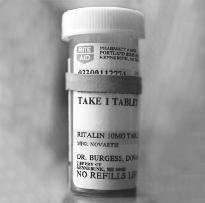Attention-Deficit/Hyperactivity Disorder - Treatment
ADHD is usually treated with one of two approaches: drugs or behavior modification. Drugs tend to be the more popular therapy because they are easy to use and seem to have more dependable results. Prescribing drugs for children, however, is not without controversy.
One group of drugs used to treat ADHD is psychostimulants. These drugs work by stimulating the production of neurotransmitters. One of the best known of these drugs is methylphenidate (pronounced meth-uhl-FEN-uh-date, trade name Ritalin). For children who do not respond to psychostimulants, a variety of other drugs are available. These include desipramine (pronounced dez-uh-PRAM-uhn, trade names Norpramin, Pertofane) and fluoxetine (pronounced floo-AHK-suh-teen, trade name Prozac), which are antidepressants, and carbamazepine, (pronounced KAHR-buh-MAZ-uh-peen, trade names Tegretol, Atretol), an anticonvulsant. The most effective drug for any one child may change as that child grows and becomes more mature.
Not all experts agree that ADHD is a disease or a disorder. According to some, many children have a lot of energy when they are growing up. A normal, healthy child is naturally curious and full of activity, so should parents and teachers really be surprised when some students have trouble sitting still in classes for six or more hours a day? Some experts think this behavior is perfectly normal.
These experts argue that giving children drugs is the wrong answer to a perceived problem. They agree that the drugs work in the short-term: drugs help children settle down and focus on their school work. But they argue that parents and doctors should also deal with the emotional or psychological problems that may have contributed to the child's behavior. Some researchers are concerned over whether children are being helped in the long-term.
Another issue has arisen about the use of drugs to control ADHD. Some young men and women have now been taking Ritalin for more then ten years. They started taking the drug during elementary or high school and continue to take the drug in college. They find that Ritalin helps them to concentrate on their class assignments. Some students report that they take up to twenty-five pills a day to get the effect they need. Such doses can have harmful effects on users. These effects include sleeplessness, loss of appetite, and fatigue.
Most authorities agree that drugs can solve ADHD problems for some children. How frequently drugs are prescribed and just how to properly diagnosis ADHD is still being debated.
All drugs used to treat ADHD have side effects, some of which can be serious. For example, methylphenidate may cause insomnia, nervousness, and loss of appetite; desipramine can cause dry mouth, disorientation, and irregular heartbeat.
Behavior modification therapy is a set of techniques designed to change the way people behave. Rewards are provided for good or correct behavior, while punishment may be given for bad or inappropriate behavior. For example, a child may be given a token each time he or she behaves in an approved manner. When the child has collected enough tokens, he or she may redeem the tokens for some kind of prize or reward.
One form of behavior modification is called cognitive-behavioral therapy. In this form of therapy, the child is taught to recognize the connection between thought and action. He or she is then shown how to change behavior by changing his or her negative thoughts.
Individual and family counseling can also help ADHD patients. Patients and their families can be helped to understand possible causes for the inappropriate behavior and how to deal with and eventually change that behavior.
Alternative Treatment
A number of alternative treatments for ADHD exist. In many cases, there is little or no scientific evidence that these treatments are effective. Many people believe strongly in them, however, and recommend their use with ADHD children. These treatments include:

- EEG biofeedback. During EEG (electroencephalograph; pronounced ih-LEK-tro-in-SEH-fuh-lo-graf) biofeedback, an ADHD child watches the brain waves produced when he or she is behaving correctly or incorrectly. The child is then trained to adjust that behavior to produce correct brain waves.
- Dietary therapy. This therapy is based on the theory that ADHD is caused by incorrect diet. Patients are taught to eat foods high in protein and complex carbohydrates (such as starches like potatoes and pasta), and to avoid white sugar and other types of foods.
- Herbal therapy. Herbal therapy uses a variety of natural products to relieve the symptoms of ADHD. Some examples include ginkgo, to improve memory and mental sharpness, and chamomile, to help calm the patient. Although herbs like these are popular with some doctors, their effectiveness and safety have not been proved scientifically.
- Homeopathic medicine. This approach has perhaps the best chance of success of all alternative treatments. It treats the person as a whole, seeking to discover the fundamental problems that have led to ADHD in the first place.

Comment about this article, ask questions, or add new information about this topic: